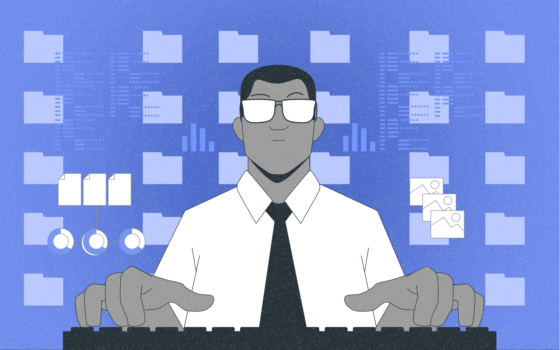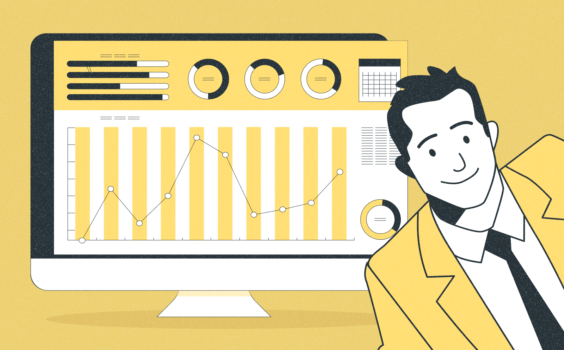Millenials, Gen Z, Gen X. What are Their Attitude Differences in the Workforce

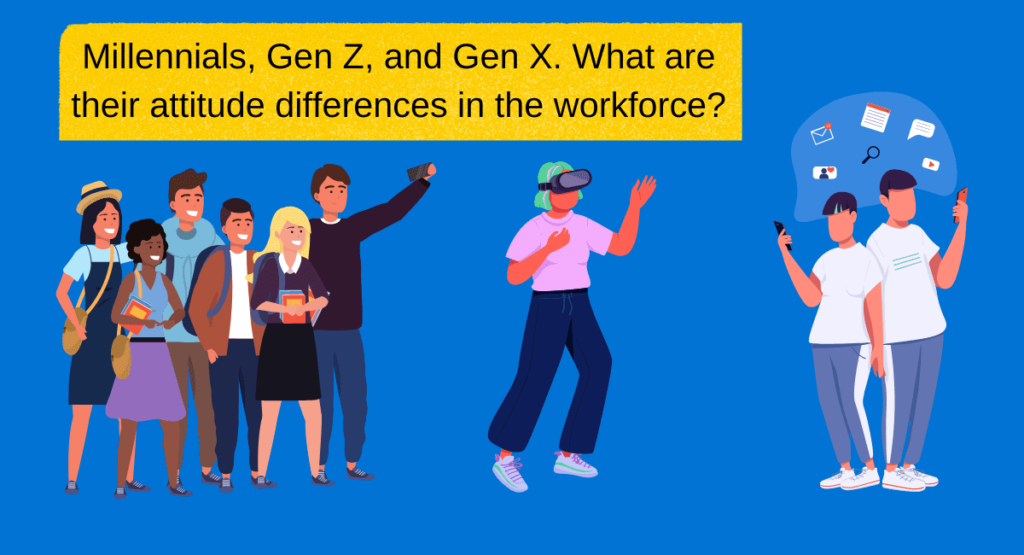
There are three main generations in the workforce today: millennials, Gen Xers, and Gen Zers.
Each generation has a unique attitude that can impact team performance. If you want your business to thrive in today’s fast-paced world, it’s essential to understand how these different attitudes can work together.
In this blog post, we’ll discuss the different attitudes of each generation and strategies for combining them in the workplace.
Understanding the different generations in the workforce
Understanding the different generations in the workplace is key to positive intergenerational relationships. The different generations have their own values, work ethics, and attitudes that they bring to the table.
These generational differences are often the root of negative attitudes and conflict between employees. However, by understanding where these differences come from, employers can foster a positive work environment where all employees feel valued and respected.
The previous generation is often characterized as having a positive attitude towards work. They are seen as loyal to their employer, motivated by challenge, and willing to work long hours to get the job done.
This generation generally has a strong work ethic and expects the same from their co-workers. In contrast, the current generation is often seen as being more interested in work/life balance, flexible hours, and paid time off.
They are also more likely to switch jobs if they feel they are not being challenged or valued. While there may be some truth to these stereotypes, it’s important to remember that not all generation members think or behave the same way.
By understanding each generation’s unique perspective, employers can create a positive and productive work environment for all.
5 Characteristics of Generation Z Employees: What is a typical Gen Z attitude?

As Generation Z (born roughly between 1997 and 2012) enters the workforce, they bring a fresh set of values, attitudes, and expectations that are shaping modern workplaces. Understanding the unique characteristics of Gen Z employees is crucial for organizations aiming to attract, engage, and retain this dynamic group. Here are five key characteristics that define Generation Z employees:
1. Tech-Savvy and Digitally Native
Gen Z employees are the first generation to grow up with smartphones, social media, and instant access to information. They are true digital natives, comfortable navigating the online world and using technology in all aspects of their lives. This tech-savviness translates into the workplace, where they quickly adapt to new software, tools, and platforms. Gen Z values the convenience and efficiency that technology offers and often seeks out employers who embrace digital transformation. Their familiarity with digital communication tools also means they expect seamless integration of technology in their work environment, whether it’s for collaboration, project management, or remote work.
2. Desire for Work-Life Balance
While previous generations might have prioritized job security or career advancement, Gen Z places a high value on work-life balance. They seek jobs that allow them to maintain a healthy equilibrium between their professional and personal lives. This desire for balance is reflected in their preference for flexible work arrangements, such as remote work or flexible hours. Gen Z employees are also more likely to choose employers who offer mental health support, wellness programs, and a culture that respects their time outside of work. They see work as one part of their life, not the defining element, and look for roles that align with this holistic approach.
3. Focus on Diversity and Inclusion
Diversity and inclusion are not just buzzwords for Gen Z; they are essential values that influence their job choices and workplace satisfaction. This generation has grown up in a more diverse world and expects the workplace to reflect that diversity. They are drawn to companies that prioritize inclusive practices and offer equal opportunities for all employees, regardless of their background. Gen Z employees are also vocal about social issues and expect their employers to take a stand on matters like racial equality, gender rights, and environmental sustainability. For them, a company’s commitment to diversity and inclusion is a key indicator of its overall integrity and culture.
4. Emphasis on Continuous Learning and Development
Gen Z is highly motivated to keep learning and growing, both personally and professionally. They view their careers as an ongoing journey of development rather than a linear path of progression. This characteristic drives their demand for continuous learning opportunities in the workplace, such as professional development programs, mentorship, and access to online courses. Gen Z employees want to acquire new skills that will not only benefit their current role but also prepare them for future opportunities. They are more likely to stay with employers who invest in their development and provide clear pathways for career advancement.
5. Entrepreneurial and Independent
Gen Z is known for its entrepreneurial spirit and independence. Many in this generation have grown up in the gig economy, with side hustles or freelance work being common experiences. They value autonomy and often seek roles that allow them to take ownership of their work and make independent decisions. This entrepreneurial mindset means they are innovative, resourceful, and not afraid to challenge the status quo. However, it also means that they expect a degree of trust from their employers and resist micromanagement. Organizations that encourage creativity and provide opportunities for independent projects are more likely to attract and retain Gen Z talent.
A Millennial employees
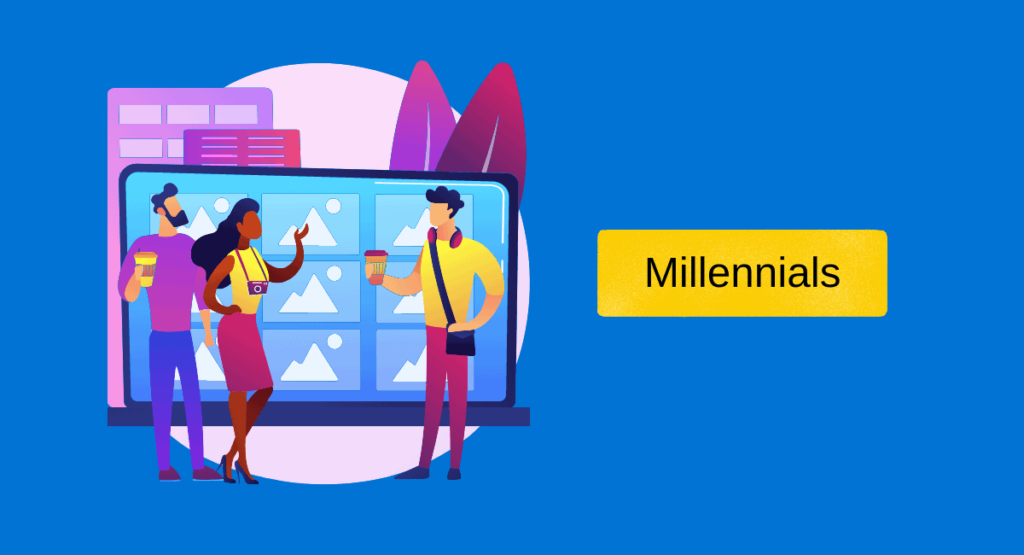
“Inevitably, many millennials said they’d made compromises in order to get into work during the economic downturn. 32% had accepted a lower salary than expected, 17% were receiving fewer benefits than expected and 17% were working away from their ideal location. Overall 72% say they had made some form of compromise.” PWC.
Millennials are often characterized as individuals who are collaborative, creative, and driven by purpose. They’re also frequently described as impatient and disloyal.
Millennials entered the workforce after 2000 and are now the largest generation in the U.S. workforce. With more than 76 million members, Millennials are also the most diverse generation in history.
They value meaningful work and want to feel connected to their organizations, managers, and colleagues. They expect constant feedback and want to be recognized for their achievements.
Managing millennials – their work ethic, expectations, and attitudes
A recent study found that millennials have a more negative attitude towards work than any other generation.
They are more likely to complain about their jobs and have higher expectations for promotions and raises. Additionally, millennials are more likely to switch jobs than older workers.
While this may seem wrong, there are some positive aspects to this generational attitude shift. For one, millennials are more likely to be proactive in career development.
They are willing to take on new challenges and learn new skills, which can benefit companies. Additionally, millennials tend to be more flexible in their work hours and locations.
They are also more likely to value work/life balance, leading to increased productivity. Overall, managing millennials requires a different approach than managing older workers.
The key is to manage them in a way that fosters their best qualities and discourages their worst. Here are a few tips:
Encourage open communication:
Millennials are used to instant gratification, so they may not be patient when waiting for feedback. Encourage them to speak up and ask questions to feel like they’re being heard.
Give clear instructions:
This generation is used to having everything at their fingertips, so don’t assume they’ll know how to do something just because you think it’s common sense. Be clear and concise in your instructions, and give examples if necessary.
Focus on their strengths:
Every employee has different strengths and weaknesses. When managing millennials, try to focus on their strengths and give them tasks that play to those
However, if handled correctly, millennials can be valuable to any organization.
A Gen X employee
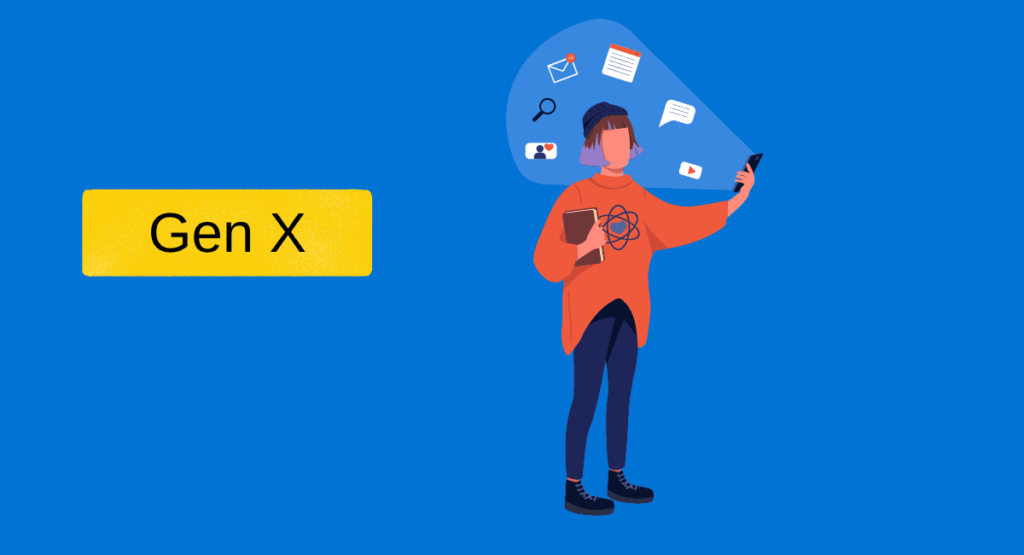
Gen X employees are hard-working and driven by performance. They’re independent, results-oriented individuals who prefer to work at the moment with short-term goals.
Gen Xers entered the workforce in the 1990s, making them the first generation to grow up in the digital era.
They’re comfortable with technology and understand how it can help their team members and the organization succeed. Gen Xers value strong leadership and prefer to be held accountable for specific, measurable goals and outcomes.
They like to control their schedules and focus on getting things done and working as efficiently as possible.
Managing Generation X – their experience, strengths, and weaknesses
Generation X is often thought of as a highly individualistic group and independent group. In many ways, this is true.
Gen Xers tend to be very self-motivated and resourceful. They are also comfortable with change and adapt well to new situations. However, this independence can sometimes make them seem aloof or even resistant to authority.
In the workplace, Gen Xers often have a strong work ethic and are willing to put in the extra effort to get the job done.
They are also often very detail-oriented and take pride in their work. However, their independence can sometimes make them resistant to authority figures or rules and regulations.
This can sometimes lead to conflict with managers or other authority figures.
On the one hand, Gen Xers tend to be highly skilled and adaptable. They’re often quick to learn new things and aren’t afraid to take on new challenges.
They may also be less likely to follow traditional career paths or rise through the ranks of an organization.
Despite their independent streak, gen Xers are often very team-oriented and good at working collaboratively. They value open communication and feedback and are often very good at brainstorming creative solutions.
In short, they have a lot to offer employers – if they can learn to manage them effectively.
How These Generations Impact Team Performance

Millennials and Gen Xers have distinctly different leadership styles. Millennials prefer to be led by their hearts, whereas Gen Xers are led by their heads.
As a result, the two groups can clash regarding decision-making, especially if one generation holds more power than the other. However, when managed effectively, these generational differences can enhance team performance.
Gen Z Employees Are Tech-Savvy and Self-Confident
Gen Z employees are comfortable with technology, so they’re likely to take the lead in adopting new organizational tools or systems.
If new tools and technologies are implemented, expect Gen Z employees to use them efficiently and effectively.
At the same time, Gen Z employees may be less familiar with organizational norms and processes, which could negatively impact their ability to work with team members who prefer traditional methods.
Millennials are Collaborative and Proactive Problem Solvers
Being both collaborative and creative, Millennials thrive on collaboration and working together. If your Millennial team members are given a chance to work together, they’ll likely find solutions to problems more quickly and with fewer resources.
Gen Xers are Driven By Accountability and Results
Gen Xers are task-oriented individuals who prefer to focus on specific goals and outcomes. These individuals are driven by performance and results, so they expect their team members to be accountable for their work.
If you’re managing a Gen Xer, make sure you’re clear on what they wish to achieve and when they want to achieve it.
If you’re a Gen Xer looking to be managed, ensure your manager is clear on your goals, priorities, and schedule.
How to Harness the Strengths of Each Generation in the Workplace
If you’re managing employees from different generations, there are several ways to harness the strengths of each:
- Be sure to understand what drives each individual. What are their motivations? What are their strengths?
- Create an environment where each generation feels supported and capable of contributing to the team.
- Regularly evaluate and adjust your management style to harness each generation’s strengths.
Tips for managing different generations in the workforce
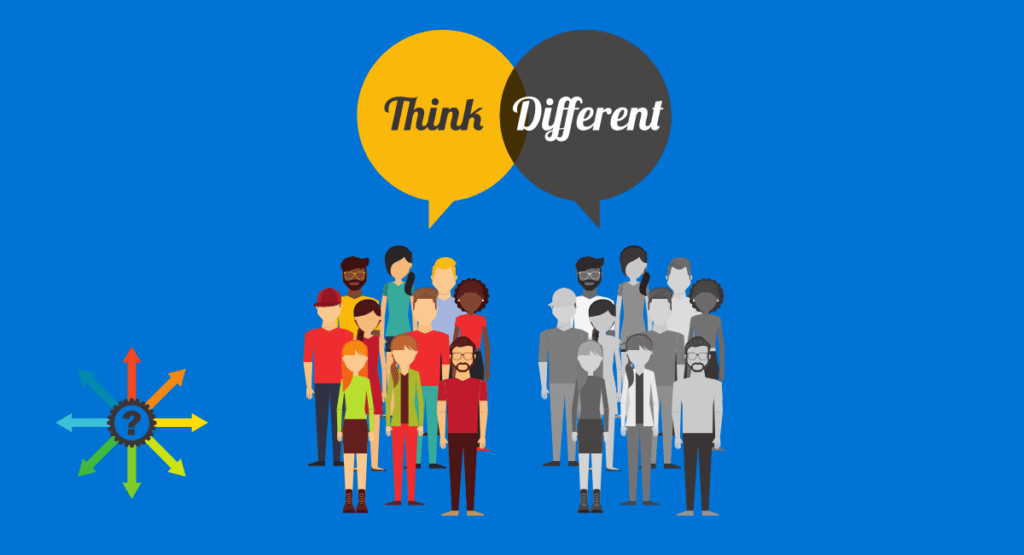
As business leaders, it’s crucial to understand how to manage different generations in the workforce. Millennials, for example, expect more frequent feedback than other generations.
They also place a high value on work/life balance and tend to be more vocal about their opinions. It’s important to stay positive when managing millennials, as they are quick to move on if they feel disengaged.
Here are some tips for managing different generations in the workforce:
Encourage open communication.
Employees of all ages need to feel like their voices are heard. Encourage open communication by holding regular meetings and creating an open door policy.
Stay positive.
A business leader must stay positive and foster a positive working environment. This will help all employees feel motivated and engaged.
Be flexible.
Millennials, in particular, expect a certain degree of flexibility from their employers. If possible, offer flexible work hours or the ability to work from home occasionally.
Each generation has its own strengths and weaknesses, but with understanding and communication, any business leader can successfully manage a multigenerational workforce.
Examples of successful generational management in a workforce
Generational differences can create challenges in any workplace. However, there are also potential benefits to managing a workforce including employees of different generations.
One example of successful generational management is utilizing employees’ different strengths and experiences from other age groups.
For example, employees closer to retirement may have more institutional knowledge and be able to mentor younger employees. In turn, younger employees can bring new perspectives and ideas to the table.
Another way to successfully manage a multigenerational workforce is to create flexible and responsive policies and procedures for employees of all ages.
Generation Experience
Employee experience is a key element of successful generational management in a workforce. By understanding the needs and expectations of employees at different stages in their careers, employers can create an environment that meets the needs of all employees.
For example, younger employees often value flexible work arrangements and opportunities for professional development, while older employees may prioritize stability and job security.
Employers can encourage loyalty and commitment from all generations by providing employees with what they need to be successful.
Additionally, by investing in the next generation of employees, employers can ensure that their workforce remains strong for years to come. By taking these steps, employers can create a workforce that is prepared to meet future challenges.
By taking into account the unique experiences and needs of employees from different generations, businesses can create an enjoyable and productive work environment for all.
Conclusion
Today’s modern workforce comprises three distinct generations.
The Millennials, Gen Xers, and Gen Z employees bring different perspectives and strengths. To harness these strengths, you can create an environment where employees feel supported and challenged.
As you manage and lead each generation, remember that their strengths may also come with specific challenges.

